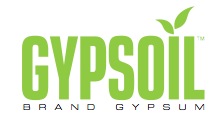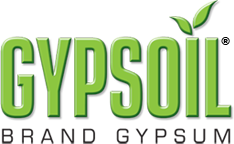News Releases
Media inquiries
Using gypsum to improve soil quality is a popular topic for farm and agricultural inflencer audiences. Please contact our communications consultant Karen Bernick at 1-866-GYPSOIL (497-7645) if you have questions, need story ideas, photos or want to set up interviews with a GYPSOIL team member. GYPSOIL also participates in many national trade shows and meetings including Ag Media Summit, Commodity Classic, National No Tillage Conference and Farm Progress show to name a few.
to improve soil quality is a popular topic for farm and agricultural inflencer audiences. Please contact our communications consultant Karen Bernick at 1-866-GYPSOIL (497-7645) if you have questions, need story ideas, photos or want to set up interviews with a GYPSOIL team member. GYPSOIL also participates in many national trade shows and meetings including Ag Media Summit, Commodity Classic, National No Tillage Conference and Farm Progress show to name a few.
High resolution photos for current news release available here.
Recorded and Powerpoint presentations from the 2014 Midwest Soil Improvement Symposium can be found on the Symposium page.
Highlights from the 2014 press conference at Ohio Farm Science Review.
A collection of general press releases can be found below:
Six reasons to use gypsum on your fields this fall

FOR IMMEDIATE RELEASE
CHICAGO...Farmers are learning that gypsum can improve soil tilth and water permeability of their fields, in addition to creating a better environment for biological activity deep into the soil profile.
GYPSOILTM brand gypsum is calcium sulfate dihydrate, CaSO4 . 2H2O, a byproduct of the process that cleans the air from coal-burning power utilities by removing sulfur dioxide (SO2) from flue gases.
Over time, GYPSOILTM neutralizes metals and chemical salts and loosens soil to improve air and water movement throughout the soil profile. Nearly all heavy soils containing clay, including gumbo, can benefit from gypsum.
According to coal industry statistics, nearly 19 million tons of flue gas desulfurization (FGD) gypsum is produced annually. 1As more and more utilities bring modern scrubbing systems online to comply with current clean air regulations, production of FGD gypsum is expected to dramatically increase. This means farmers have access to a large, steady supply for use on agricultural fields.
Here are six reasons to consider using gypsum on fields this fall:
-
Gypsum helps fields sponge water. Fields with tight clay soils are easily compacted and can be prone to clumping and crusting. Drive by these fields after a heavy rain and you’ll likely see many areas of ponding and run-off.
“With gypsum, the soil structure becomes more sponge-like so even tight clay soils readily absorb water and move it down through the soil profile rather than allowing it to pond or run off,” says Ron Chamberlain, director of gypsum programs for Beneficial Reuse Management (BRM).
-
Soil organisms will thank you. “GYPSOILTM balances the soil chemistry so that excess detrimental nutrients, such as magnesium, aluminum and sodium, are flushed away and replaced with calcium,” says Chamberlain. This not only loosens the soil but also improves the environment for soil organisms, including earthworms.
“We see more earthworm activity down deep in the subsoil which, in turn, opens up the soil for even deeper root growth and air and water movement,” Chamberlain says.
-
Gypsum applications help unlock fertility. A balanced biological system helps soil breakdown plant residues into available nutrients in the root zone. “A healthy biological system also helps unlock previously-unavailable soil minerals for the plant’s uptake,” Chamberlain says. Gypsum also supplies calcium and sulfur to soils.
-
Fields will be easier to work. Over time, soil that receives gypsum becomes more like porous, loose garden soil because of improvements in soil chemistry and biological activity. “Farmers notice how much easier it is to pull equipment through a gypsum- treated field,” says Chamberlain.
Soils dry down quicker in spring and between rains so fieldwork can start earlier or resume quickly after rain events.
Gypsum is especially helpful in no-till situations and many growers report they no longer have to rely on tools such as in-line rippers to fight compaction.
-
Improve plant vigor. With gypsum, plants remain more uniform and vigorous throughout the growing season, even in the presence of weather extremes or weed, insect and disease pressure. “Vigorous, healthy crops mature more uniformly with a higher quality and quantity crop at harvest time,” Chamberlain says.
- GYPSOILTM is easy to apply. GYPSOILTM can be broadcast with a lime or litter spreader any time you can get into the field. The recommended rate is one to two tons per acre (every one to two years) depending on soil type. As a soil amendment, it can take applications for two years or more before the full benefit is realized.
GYPSOILTM was founded in 2006 by Chamberlain and acquired by BRM in 2009. BRM identifies byproducts of various manufacturing processes that can be used in safe and effective ways to benefit land owners and conserve natural resources and preserve landfill space. Created as a byproduct of the eco-friendly process of producing electricity, GYPSOILTM is an ideal match for BRM.
GYPSOILTM mission is to make a positive impact in our customers’ soil while conserving
natural resources and protecting the environment.
1 American Coal Ash Association, 2008 Coal Combustion Product (CCP) Production & Use Survey Report.
GYPSOILTM is a division and tradename of Beneficial Reuse Management LLC.
GYPSOILTM brand gypsum can be broadcast with a lime or litter spreader any time fields are suitable for working. Photo supplied by GYPSOILTM division of Beneficial Reuse Management LLC.


